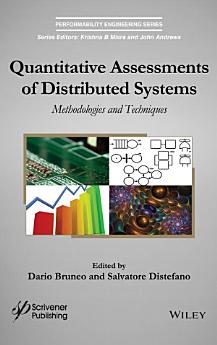Quantitative Assessments of Distributed Systems: Methodologies and Techniques
આ ઇ-પુસ્તક વિશે
The aim of the book is to provide an overview of techniques and methodologies dealing with such specific issues in the context of distributed systems and covering aspects such as performance evaluation, reliability/availability, energy efficiency, scalability, and sustainability. Specifically, techniques for checking and verifying if and how a distributed system satisfies the requirements, as well as how to properly evaluate non-functional aspects, or how to optimize the overall behavior of the system, are all discussed in the book. The scope has been selected to provide a thorough coverage on issues, models. and techniques relating to validation, evaluation and optimization of distributed systems. The key objective of this book is to help to bridge the gaps between modeling theory and the practice in distributed systems through specific examples.
લેખક વિશે
Dario Bruneo received his Degree in Computer Engineering from the Engineering Faculty of the University of Palermo (Italy) in 2000 and the PhD in Advanced Technologies for Information Engineering at the University of Messina (Italy) in 2005. Since then he has been engaged in research on distributed systems. He is currently an associate researcher at the Engineering Faculty of the University of Messina. The research activity of Dario Bruneo has been focused on the study of distributed systems with particular regards to the management of advanced service provisioning, to?the?system modeling and performance evaluation. Different research fields have been investigated ranging from the Quality of Service management, to the distributed programming, from ad-hoc and sensor networks to the performance analysis through analytical and simulative techniques. Is coauthor of more than 40 scientific papers on international journals and conference proceedings.
Salvatore Distefano is an assistant professor of the Politecnico di Milano. His research interests ?include performance evaluation, parallel?and distributed?computing, software engineering, and reliability techniques. During his research activity, he has contributed in the development of several tools such as WebSPN, ArgoPerformance and GS3.?He has been involved in several national and international research projects. He is author and co-author of more than 80 scientific papers.






